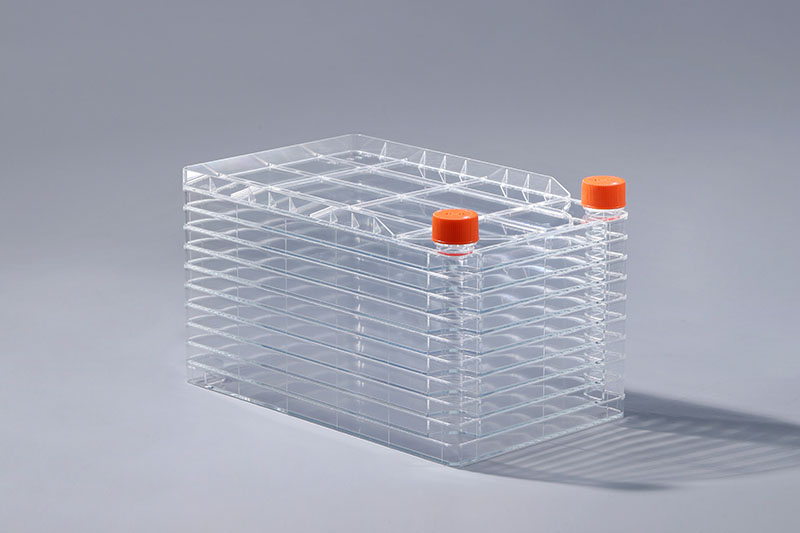Khi nuôi cấy tế bào bằng cách sử dụng Áp suất thẩm thấu lý tưởng của nhà máy tế bào được nuôi cấy thay đổi theo loại và chủng tộc của tế bào. Áp suất thẩm thấu của huyết tương người là 290 mmol / L, được coi là áp suất thẩm thấu lý tưởng để nuôi cấy tế bào người trong ống nghiệm. Áp suất thẩm thấu của tế bào động vật có vú nói chung là 290 đến 300 mmol / L. Nguyên bào sợi ở phổi phôi người là 250-325 mmol / L và chuột là khoảng 310 mmol / L. Trong các ứng dụng thực tế, áp suất thẩm thấu từ 260-320 mmol / L là phù hợp với hầu hết các tế bào. , nó dễ bị ảnh hưởng bởi các yếu tố khác nhau. Chẳng hạn như nhiệt độ, giá trị PH, môi trường khí,… trong đó áp suất thẩm thấu cũng là một khía cạnh rất quan trọng. Vì vậy, áp suất thẩm thấu là một trong những điều kiện quan trọng để nuôi cấy tế bào trong ống nghiệm. Việc duy trì áp suất thẩm thấu của tế bào mô động vật có vú và động vật khác trong ống nghiệm chủ yếu liên quan đến NaCl, nhưng không thể bỏ qua mối quan hệ của áp suất thẩm thấu của các chất điện môi khác. Áp suất thẩm thấu tỷ lệ với số phân tử và ion của chất tan trên một đơn vị thể tích dung môi. Vì lý do này, điều rất quan trọng là phải kiểm soát cân bằng ion trong môi trường nuôi cấy theo một tỷ lệ nhất định và duy trì áp suất thẩm thấu bình thường. Điều này không chỉ để duy trì sức căng của tế bào mà còn điều chỉnh quá trình trao đổi chất của tế bào. Do sự vận chuyển ion ngoại bào và nồng độ ion làm thay đổi quá trình vận chuyển các chất dinh dưỡng khác (như axit amin, sacaroza, v.v.), nên nó ảnh hưởng trực tiếp đến hệ thống tổng hợp cơ bản của tế bào.
Tóm lại, áp suất thẩm thấu ảnh hưởng trực tiếp đến sự phát triển bình thường của tế bào. Khi sử dụng nhà máy tế bào để nuôi cấy tế bào, cần phải duy trì áp suất thẩm thấu thích hợp tùy theo điều kiện của tế bào, để đảm bảo tế bào phát triển tốt.
The ideal osmotic pressure of cell factory cultured cells varies with the type and race of cells. The osmotic pressure of human plasma is 290 mmol/L, which is considered to be the ideal osmotic pressure for culturing human cells in vitro. The osmotic pressure of mammalian cells is generally 290 to 300 mmol/L. Human embryonic lung fibroblasts are 250-325 mmol/L, and mice are about 310 mmol/L. In practical applications, the osmotic pressure of 260-320 mmol/L is suitable for most cells.
To sum up, the osmotic pressure directly affects the normal growth of cells. When using the cell factory to cultivate cells, it is necessary to maintain an appropriate osmotic pressure according to the conditions of the cells, so as to ensure the good growth of the cells.
The FAI climbed 5.9 percent year-on-year in the first 11 months of 2018, quickening from the 5.7-percent growth in Jan-Oct, the National Bureau of Statistics (NBS) said Friday in an online statement.
The key indicator of investment, dubbed a major growth driver, hit the bottom in August and has since started to rebound steadily.
In the face of emerging economic challenges home and abroad, China has stepped up efforts to stabilize investment, in particular rolling out measures to motivate private investors and channel funds into infrastructure.
Friday's data showed private investment, accounting for more than 60 percent of the total FAI, expanded by a brisk 8.7 percent.
NBS spokesperson Mao Shengyong said funds into weak economic links registered rapid increases as investment in environmental protection and agriculture jumped 42 percent and 12.5 percent respectively, much faster than the average.
In breakdown, investment in high-tech and equipment manufacturing remained vigorous with 16.1-percent and 11.6-percent increases respectively in the first 11 months. Infrastructure investment gained 3.7 percent, staying flat. Investment in property development rose 9.7 percent, also unchanged.
 English
English



















































